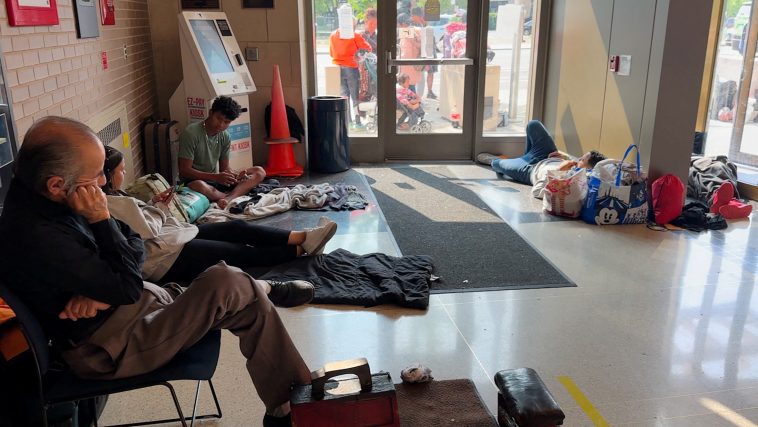Chicago’s Mayor Brandon Johnson announced on Monday a revamp to the city’s migration policy. As part of this revamp, by year-end, his administration is set to merge migration assistance efforts with those addressing homelessness. This strategic maneuver moves the city closer towards a ‘unified sheltering system.’ Effective Monday, the available bed count in the city has now been enhanced by an additional 3,800 beds. This is in addition to the ‘3,000 existing Department of Family and Support Services (DCFC) beds’ that form the backbone of the homelessness services suite.
A significant shift in policy involves not offering newcomers an assured provision of shelter in the city. ‘Having transitioned from an emergency-centric approach to a more tactical, equitable and cost-efficient strategy, we can now address homelessness in a way that caters to everyone in need,’ proclaimed Mayor Johnson. Additionally, a series of other amendments were announced.
Prominently, the 30-day shelter extension based on ‘Public Benefit enrollment’ for anyone currently housed in the New Arrivals shelter system, or anyone entering it freshly, will be phased out. Regulation of initial sheltering will also be revised, restricting the Landing Zone’s facilities exclusively to new migrant families and individuals who have resided in the United States for less than a month.
Further modifications concern operational hours of the Landing Zone, aiming to mirror those of the State Intake Center: from 8:00 a.m. to 8:00 p.m. This change is expected to be completed by November 1, 2024. Mayor Johnson also detailed future plans for shutting down both the Landing Zone and the State of Illinois intake center by December 31, 2024.
Execution of a plan to decrease the number of shelters is also in the pipeline. The aim is to reach a budgeted target of 2,100 city-funded beds by the conclusion of 2024. The reconfigurations are being implemented a year after the city witnessed a heavy influx of migrant arrivals, almost every day via bus from the southern border.
The abundance of new arrivals started to pressurize city resources significantly, leading to migrants finding accommodation in unconventional places like police stations and airports. Johnson recalls the crisis period, ‘At its most severe point, 12 to 15 buses were arriving daily, and we had a staggering 15,000 beds in active service.’
Since August 2022, over 50,000 migrants have landed in Chicago, sparked by the commencement of the bus program under Texas Governor Greg Abbott. On a single Monday morning, nearly 5,000 residents were housed across 13 different shelters with 21 individuals awaiting placement.
Echoing gratitude, Mayor Johnson stated, ‘I am deeply appreciative of the people of Chicago for their steadfast resilience. No other place on earth has demonstrated such enduring strength in dealing with this crisis.’ Currently, Chicago still operates 13 shelters catering to migrants.
The updated sheltering strategies from Mayor Johnson’s desk arrives as he grapples with a budget deficit inching towards the $1 billion mark. As part of the One Shelter System, an additional 3,800 beds will be made available, although cost implications have not yet been specified.
Johnson told reporters, ‘There will be a request.’ Referring to the unified shelter system, he asserted, ‘The request is to align with this unified approach. That’s what we’re seeking. We’re asking the City Council and the city of Chicago to seize this historic moment.’
Assisting in the reform of these strategies is Illinois Governor JB Pritzker. Having partnered with Chicago on this humanitarian mission, Pritzker has also contributed to the new proposals. Pritzker said on Monday, ‘I am confident that everyone understands that both the well-being of our community and the migrants are at the heart of these revisions.’
These budget-conscious modifications come in the wake of the defeat of the ‘Bring Chicago Home’ initiative earlier this year. It aimed to introduce a tax on high-value property transfers to raise funding for homeless services. Mayor Johnson opined that if it had passed, the city could have housed an even larger number of migrants.


